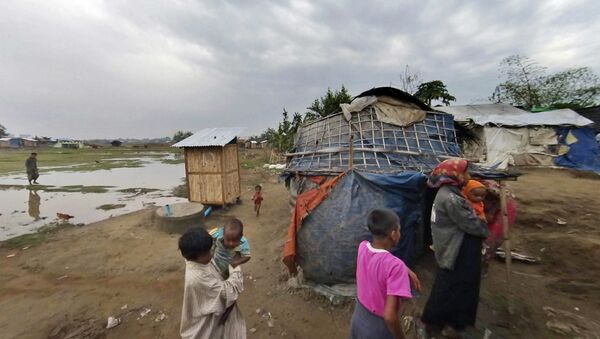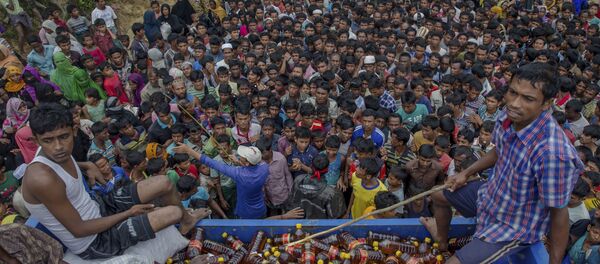MOSCOW (Sputnik) — A renewed cooperation deal with Myanmar Red Cross will help the Turkish Red Crescent (TRC) access hard-to-reach places in Myanmar's state of Rakhine, where people have been suffering as a result of government's campaign against the insurgents, TRC President Dr. Kerem Kinik told Sputnik on Friday.
On Wednesday, the TRC renewed a cooperation agreement with Myanmar Red Cross for another three years.
#MyanmarRedCross #volunteers assist the people who fled from #Maungdaw to #Sittwe, #RakhineState pic.twitter.com/1QHhtBQfBb
— Myanmar Red Cross (@MyanmarRedCross) 29 августа 2017 г.
"TRC’s renewed partnership and scaled up humanitarian operation in Myanmar will include capacity-building and experience-sharing activities with the Myanmar Red Cross and implementing further community resilience- building programmes. Having greater access via the signed cooperation agreement to hard-to-reach areas in Rakhine State, where, if not all, most targeted and affected populations are Muslims, TRC’s programmes will continue to assist all people in need in the area with no discrimination of any kind but based on humanitarian needs only," the TRC president said.
#MyanmarRedCross #volunteers assist the people who fled from #Maungdaw and #Buthedaung to #Sittwe, #RakhineState and provide food, ORSs. pic.twitter.com/rofqsyMUJh
— Myanmar Red Cross (@MyanmarRedCross) 4 сентября 2017 г.
The organization has been also helping the refugees from Myanmar, mainly the members of the Rohingya minority, fleeing to neighboring Bangladesh. According to Dr. Kinik, a large fund-raising campaign is launched in Turkey, which is ongoing with generous contributions of the Turkish people, the government, NGOs and private sector.
#MyanmarRedCross #volunteers assist the people who fled from #Maungdaw and #Buthedaung to #Sittwe, #RakhineState pic.twitter.com/FqHtj21PmN
— Myanmar Red Cross (@MyanmarRedCross) 1 сентября 2017 г.
"Funds raised in this campaign will be used in relief activities both in Myanmar and Bangladesh hubs for the displaced populations and host communities in need," Dr. Kinik underlined.
According to the humanitarian organization's president, the TRC has started to deliver food, hygiene kits and other necessities to 10,000 people daily, in partnership with the Turkish Development Agency (TIKA), "particularly for new arrivals in Kutupalong and Balukhali refugee and makeshift camps," and plans to increase its capacities in the next few weeks.
"Regular delivery plans have been scheduled for the months ahead and local procurement of 50,000 monthly family food packages and 50,000 hygiene kits have been completed. In addition to this, in partnership with the Ministry of Health of Turkey, two field hospitals from Turkey will be shipped by the TRC and activated soon, in Cox’s Bazar [a city in Bangladesh, not far from the border with Myanmar's troubled state of Rakhine]," Dr. Kinik said.
The logistics capacities of Bangladesh Red Crescent, helping refugees from Myanmar, are set to be improved by new mobile storage units, he added.
"An air delivery from Turkey is being prepared to transport the field hospital, mobile storage units and other items assessed as necessary," the president specified.
Dr. Kinik expressed gratitude to the government of Bangladesh, which facilitated the access to people in need for the humanitarian organizations.
"TRC will continue to engage, together with the Bangladesh Red Crescent, with the Government of Bangladesh and likewise in Myanmar and maintain a regular dialogue with the authorities and decision-makers to ensure that rights and needs of those seeking refuge and protection in Bangladesh or those in Myanmar are addressed and policies are informed of humanitarian imperatives and principles," the TRC president said.
Myanmar's government has been leading a military campaign in the state of Rakhine against Rohingya insurgents since late August. The operation followed an attack on the state security forces' posts.
The Rohingya minority is denied citizenship under Myanmar's law as a result of a decades-long conflict.
The international community has repeatedly urged the country's government to address the crisis.



